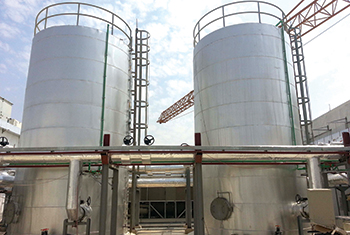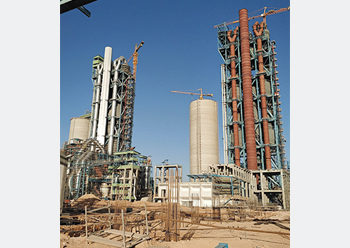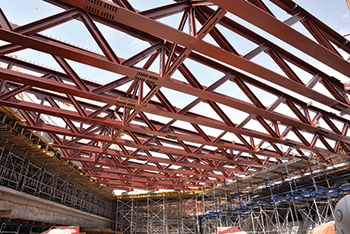Al Sharq builds on steely performance
01 July 2019
Al Sharq Factory Steel Industries Company (ASF), a Saudi-based structural steel fabricator, is on the expansion path, moving into larger premises and extending its reach beyond Saudi Arabia – and now has a brand new logo to reflect this growth and its ambitions.
The Riyadh-based future-focused company has written major success stories for itself, that have involved work on the prestigious Riyadh Metro, Yamama Cement Factory, King Abdulaziz international Airport, Dar Al Hijra project in Madinah, King Abdullah Financial District, Princess Noura University, power plants like PP11, PP12, PP13 and PP14, just to name a few. To these projects, ASF has offered high-quality products that conform to Saudi and international standards including steel structures, rail track/profile sections, steel façade works, secondary steel structures, forming and flanging works, mixers, belt conveyors, chimneys, stacks, silos, and vessels for cement plants and power plants.
These assignments have been challenging, but playing a part in their execution has given ASF the opportunity to become a sought-after fabricator for both current and upcoming projects, Zaid Abu Nsair, marketing manager, tells Gulf Construction.
 |
|
Viaduct handrails by ASF ... for Lines 4 and 6. |
ASF undertakes fabrications for various sectors of the economy including general contracting, oil and gas, power generation, petrochemical structures, electromechanical steel works, aviation, railways, marine and ports and other sectors.
Its largest ongoing project is the Riyadh Metro, where is currently busy delivering steelworks, bridges, formwork, structural canopies for stations for all the consortiums working on this mega transportation project.
For Lines 1 and 2, being built by the BACS consortium, ASF has supplied different types of structures for wayside equipment for the bridges, and supporting structures, in addition to special tree grates for the Olaya-Batha corridor (OBC) stretching from north to south through the centre of Riyadh.
Currently, it is developing park-and-ride structures comprising cantilever beams and gratings, as well as walkway fences and cladding supports under a subcontract from Safid, a Saudi manufacturer.
For Line 3, which is being constructed by the Arriyadh New Mobility (ANM) consortium, ASF is undertaking special metal works for deep underground stations, park-and-ride structures, air-conditioning yard (ACY) room structures, in addition to emergency staircases at various locations for bridges, shaft stairs for emergency exits and other structures.
 |
|
Storage tanks fabricated for STC. |
One of ASF’s mega projects in Line 3 is the iconic Qasr Al Hokm station in the old downtown area. Here, the company has already provided mega beams and trusses that consist of 3,000 tonnes of steel, including special mega beams weighing 250 tonnes segmented into five to seven sections. Furthermore, fabrications for the lower level have all been delivered. Delivery of special trusses and installation to the upper level has started.
For Lines 4, 5 and 6, which is being built by the FAST consortium, ASF is finalising the remaining quantities of walkway fences for all bridges in Lines 4 and 6, wayside equipment structures, signals and lights poles. It has also fabricated different foundations plates and structures, fire pipes supports, traction power station (TPS) room structures for deep underground stations (for Alstom and Wooson), and different passenger screen doors (PSD) structures.
Abu Nsair says the Riyadh Metro is just a year or less from completion, but ASF is still securing more packages from all consortiums that include different types of structural and metal works for shallow, at-grid and deep underground stations, landscape and hardscape works, as well as a lot of steel furniture, pollards, and security barriers.
Another major completed project handled by ASF was the new Yamama Cement Factory, for which it produced fan housings, huge chimney stacks and major piping support works along with other special steel structure works, he says. ThyssenKrupp Industrial Solutions is building the project, which is now at its commissioning stage.
In addition to these, other projects include a test cell engines industrial building at King Abdulaziz International Airport in Jeddah with Al Muhaidib Company and Cenco of the US, new storage tanks for Saudi Telecom Company (STC) compounds; various buffering and chiller tanks for data centre projects through clients like MTC; huge skid-base plates for Saudi Aramco through Suzler Saudi Pump Company; and skylight structures, mud structures, and sliding structures for royal palaces in Diriyah through Giugiaro Architectures and Structures of Italy.
 |
|
Yamama Cement Factory ... a key project for ASF. |
Commenting on business, Abu Nsair says it is growing and there is a marked improvement from last year.
He says: “The country has announced huge projects, such as Qiddiya, Neom, the Red Sea Project, Amala project and King Salman Gardens and these are massive developments.
“Then there are the King Abdullah International Gardens, renewable energy projects, and the soon-to-be-awarded nuclear projects for energy production, new airports, medical cities, etc.”
Such huge projects, he says, present great opportunities for ASF and are sufficient to keep business running in all sectors.
ASF has also shown its keenness in participating in renewable energy projects.
Abu Nsair says as Saudi Arabia’s Vision 2030 spurs growth in all aspects of the economy, the kingdom is aiming at becoming a leader in renewable energy.
“It has already started masterplanning and execution of solar energy projects and wind farms in the north and west of the country, offering great opportunities for local companies to be part of such ventures,” he points out.
ASF, he says, has made the right approaches, and registered with the main contractors with a view to be part of the projects during 2019 and beyond.
ASF is being led by the clear vision and strategy of the company’s CEO, Eng Tarek Halabi, who has always aimed to be a top ranking steel fabricator.
Halabi remarks: “I believe ASF has established an excellent reputation over the past 20 years, building a portfolio of commercial and industrial projects. These projects have played a big role in our expansion and further investment in our facility.”
“These projects present infinite horizons, and with the fast-changing technology, and architecture becoming more imaginative, the challenges that the future offers are also increasing,” he adds.
Meanwhile, the company has been aggressively pursuing its growth plans since its establishment in 2000. ASF is looking at becoming an advanced fabricator equipped with robots. Its robotic line for coping, marking and cutting is up and running. There are plans to get more robotic lines for cutting and welding which will be launched once the company finds suitable technology that meets its requirements to serve the market demands for diverse steel fabrications.
- Dome takes centre stage at Expo site
- Constructsteel makes debut in Mideast
- Al Sharq builds on steely performance
- Berdan Civata fasteners secure mega structures



